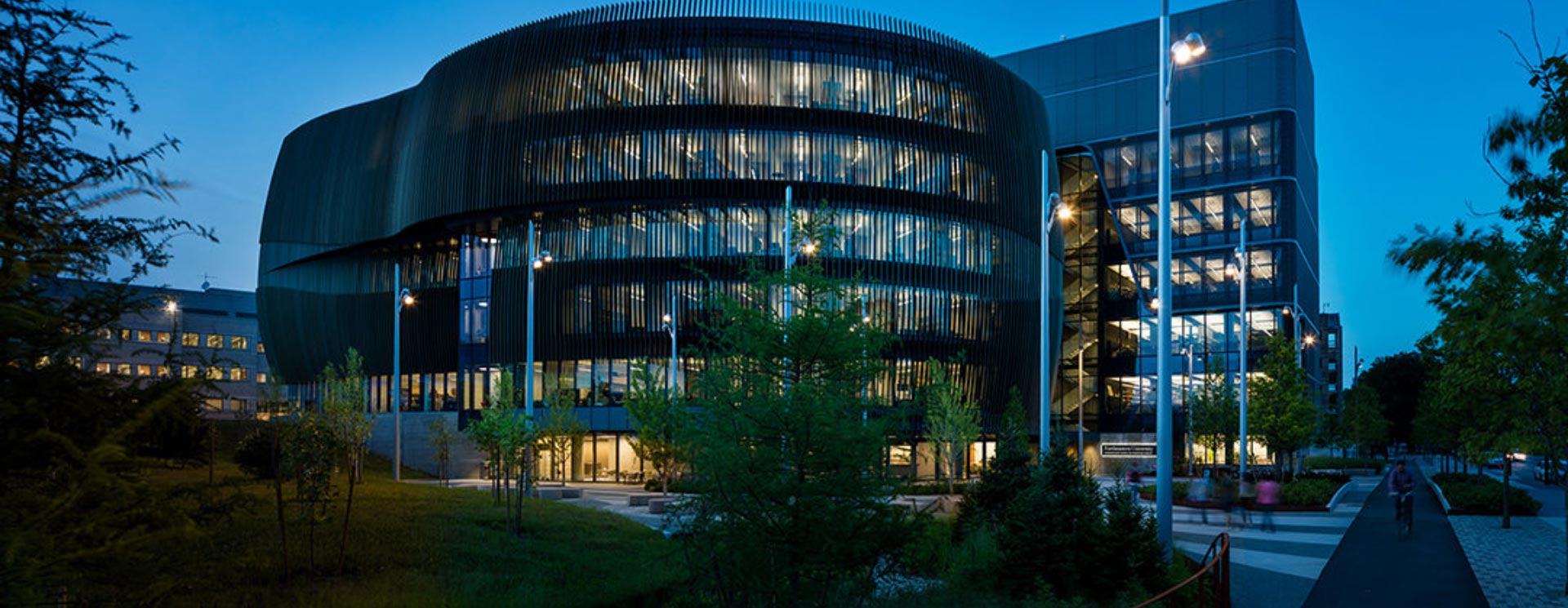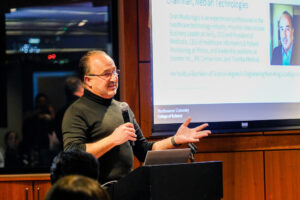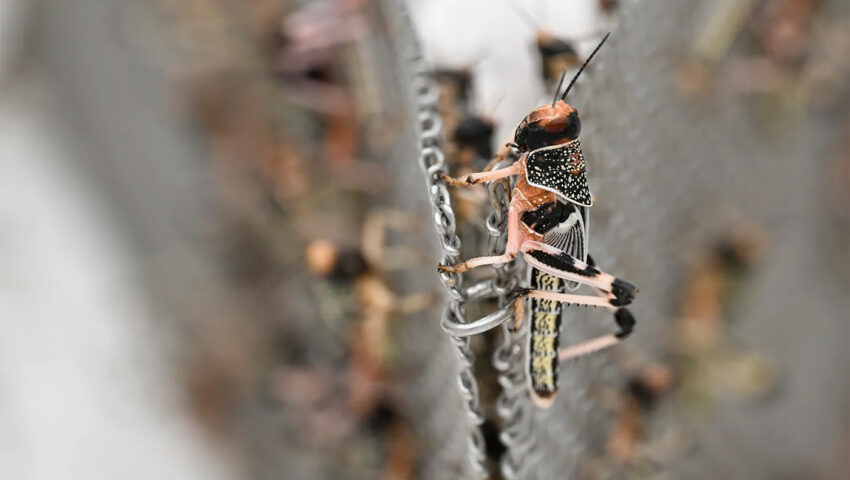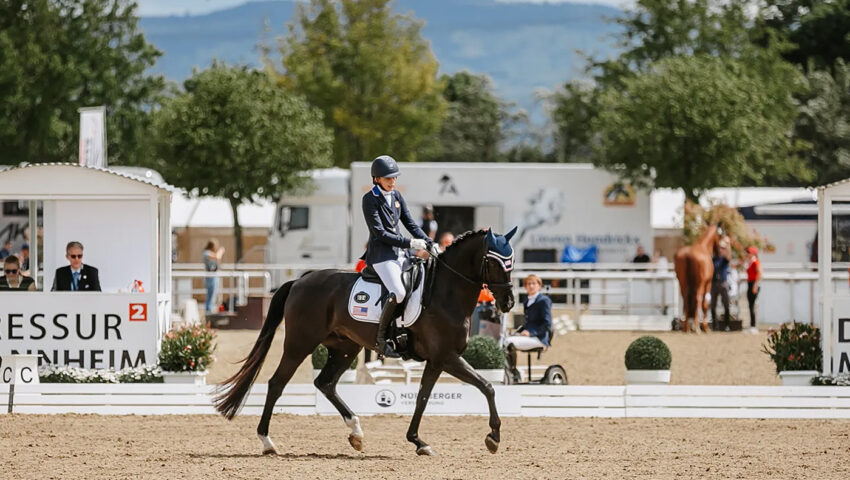
Faculty Labs
News
Turning Vision into Action: Science Students Recognized for Entrepreneurial Endeavors
This spring the College of Science held the first COS Entrepreneurship Recognition Dinner to recognize undergraduate COS students who are promoting entrepreneurship in the College. The keynote speaker was Oran Muduroglu, entrepreneur and parent of a Northeastern student.

Muduroglu is an innovator in healthcare technology with over 30 years of experience, having founded and successfully exited multiple startups. He has held significant leadership roles, including CEO positions at Medicalis and Stentor, and was a business line leader at Alphabet. He is the CEO of Coeus Health and chairman of the board for Caristo and Median Technologies, focusing on advancing healthcare through predictive AI and home care solutions.
The support and contributions of Muduroglu and his wife Maryam have helped accelerate the Science Connects to Innovation Program, which empowers undergraduate science students to engage with Northeastern’s venture creation network, offering support for recognizing and pursuing entrepreneurial opportunities.
“We are very excited about supporting the College of Science Entrepreneurship. Entrepreneurship is the most creative, empowering expression of a free mind, and central to Northeastern’s translational role in education of the sciences,” says Muduroglu.
The following students were recognized at the event and reflected on the role entrepreneurship plays in their life and what they hope for in the future:
Responses have been edited for brevity and clarity.
Lyric Westlund, behavioral neuroscience ‘25 (inaugural recipient of the Science Connects to Innovation Scholarship)

This recognition has been one of the defining moments of my career at Northeastern so far. At the beginning of the year, I found myself unsure of my co-op and feeling anxious about what the future holds. I ended up studying abroad, changing my major, and redirecting my aim towards entrepreneurship and innovation. Receiving the Science Connects to Innovation Scholarship was the first time I felt confident that I was doing the right thing in changing my path.
This summer I am working at a startup out of Boston and Buffalo, NY to experience the world of entrepreneurship in action. I am incredibly excited and can’t wait to see where I end up next.
Alexis Canzanese, psychology ‘25, minors in consulting and public health

Being recognized by COS for my entrepreneurial aptitude was truly an honor, after nearly 13 months of developing the first COS Student Leadership Council (SLC) and successfully hosting four major events on campus. This inspired me to continue growing as an entrepreneur and leader, not only at Northeastern, but also in my professional life beyond the university.
I foresee entrepreneurship being a core part of my future. My team and I will continue to develop the COS SLC throughout the summer and into the fall of 2024. After I graduate, I plan to use my leadership and entrepreneurial skills to launch my own startup – ideas are still in the making – and thrive in whichever field I pursue full time.
Alexis Musaelyan-Blackmon, BS data science and biology, MS data science ’25

This recognition is incredibly meaningful to me. It validates my dedication to driving positive change in the tech industry by leveraging technology for impactful solutions and it underscores the importance of innovation in entrepreneurship.
Entrepreneurship is at the core of my future aspirations. I am committed to making a lasting impact through entrepreneurship by creating solutions that not only advance technology but also address critical societal needs. I see myself founding and leading tech startups that tackle pressing challenges in cybersecurity and public health like my current initiative, Exploro, which streamlines clinical research recruitment.
This recognition allows me to push boundaries and innovate, not only through startups but also creative endeavors. For me, innovation means creating, whether that involves publishing another book like Blossom or developing more secure solutions in cybersecurity. To innovate is to create, and I’m dedicated to discovering what’s possible in both realms.
Kyra Gregorio, behavioral neuroscience ‘26, minor in graphic and informational design

Entrepreneurship has only been a part of my life for about a year now and there is still so much I am eager to explore. Being the first Entrepreneurship Co-op student at COS and inserting myself into an innovative and hardworking environment with unlimited support has expanded my knowledge greatly. I am endlessly thankful for the new connections I’ve made and the skills and information I get to apply to my personal endeavors.
To me, the backbone of entrepreneurship is a combination of creativity, perseverance, and the desire to assist an existing problem. It is an opportunity to think outside the box and fabricate a contemporary solution with the help of extensive research, mentors and/or colleagues, and taking the occasional risk.
Although I am not currently sure how entrepreneurship will fall into my future, I have a great passion for finding alternative methods of medicine for neurological disorders and mental illnesses.
Roux researcher receives top award for work on sleep problems in children with autism
Bree Taylor, a research assistant professor in life sciences and medical science at Northeastern University’s Roux Institute, has always been fascinated by sleep.
More specifically, the intersection of sleep and behavior and mental health, specifically in the context of children with autism.
Taylor, an emerging researcher in the field of mental and behavioral health, was presented with the Harold Osher Award for Excellence in Clinical and Population Health at the annual Lambrew Research Retreat sponsored by the MaineHealth Research Institute on May 1st, 2024. One hundred and thirty abstracts were submitted for the award, and after a blind panel review, Taylor’s abstract, “Sleep Problems in Children with Autism at the Time of Psychiatric Hospitalization in Relation to Parental Stress and Self-Efficacy,” was awarded first place in the category of clinical and population health research.
Taylor’s research focuses on the sleep problems experienced by children with autism and their impact on families, with a focus on children with profound autism who are more likely to suffer from sleep disorders.
“I think of sleep as the glue or lynchpin that keeps families functioning together,” Taylor says. “If kids aren’t sleeping, no one is sleeping. It affects so much more than we realize.”
Read more from The Roux Institute, Northeastern University
Photo provided by Bree Taylor
Desert locusts’ jaws sharpen themselves, Northeastern materials scientist discovers
Sharks lose teeth all their lives, replacing them in a kind of endless rotating Rolodex, while humans, of course, get only our two sets. Beavers’ teeth, notoriously, grow all their lives and have to be worn down to prevent injury.
New research has now placed another animal into the self-sharpening set, Schistocerca gregaria, the desert locust.
Ulrike G. K. Wegst, research associate professor of physics at Northeastern University, has discovered that locust exoskeletons build up concentrations of zinc in their mandibles, which hardens their “shovel-shaped mouthparts” — according to the research — in relation to the surrounding cuticle.
A locust’s exoskeleton is composed of chitin, a fibrous material not unlike the cellulose found in plants and common to both insects and marine life like crustaceans.
An animal’s chitin varies depending on use. In some parts of the body it needs flexibility — e.g., around jaws that need to open and close — and in others it needs significant hardness.
Read more from Northeastern Global News
Photo by Felix K’stle/picture-alliance/dpa/AP Images
Fiona Howard’s body was collapsing. Now she’s a world-ranked para dressage rider aiming for the Paris Olympics
Perched at the entrance of a stadium in Ocala, Florida, in mid-March, Fiona Howard takes a breath and coaxes a large, dark bay gelding with a gash of white down his face into a smooth trot.
She and the horse, an 11-year-old Hanoverian called Diamond Dunes, have only known each other a week. But their first competition together in dressage — the equestrian discipline sometimes referred to as “horse ballet,” in which riders and their mounts complete a sequence of choreographed movements to accumulate points — has been an auspicious one. After earning top marks for two previous rides at the weekend-long event, the pair enters the rectangular show ring for their third and final outing, a “freestyle” routine set to the thundering film score of “Avatar.”
In time to the music, they move seamlessly from figure eights to lengthened trots and a sidestepping sequence. Howard sits tall and straight; the horse’s long limbs seem to float just above the dirt. They finish in first place. “He went out there and crushed it,” Howard gushes about Diamond Dunes in an interview a few weeks later. “He’s really talented, with a great brain.”
The performance is impressive on its own; even more so because Howard, 25, has almost no control of her body from the torso down.
A 2021 graduate of Northeastern University, Howard has become one of the world’s top-ranked riders in para dressage, a style that accommodates physical disabilities, since taking up the sport three years ago. She was an accomplished equestrian in her youth, but a series of catastrophic health problems left her hospital-bound for much of her teens. She has since competed for the United States in elite para dressage competitions in Qatar, Europe and Australia; she divides her time between the U.S. and Germany, training with the top riders in the sport.
Read more from NGN Magazine
Photo courtesy of Fiona Howard



